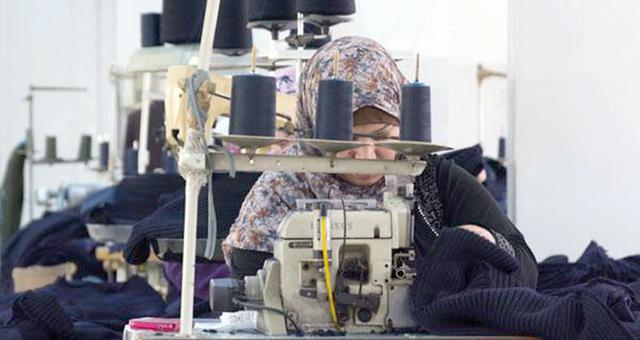You are here
Report calls for promoting decent work by digitising wages
By Maria Weldali - Nov 07,2021 - Last updated at Nov 07,2021

A report titled ‘Promoting Decent Work by Digitising Wages Responsibly in Jordan’ showed that an estimated two-thirds of garment workers in Jordan still receive their wages in cash every month (Petra file photo)
AMMAN — A report titled “Promoting Decent Work by Digitising Wages Responsibly in Jordan” showed that an estimated two-thirds of garment workers in Jordan still receive their wages in cash every month.
The report prepared by Better Work, ILO, and the German Agency for International Cooperation (GIZ), said that “with further commitment to and investments in the emerging inclusive digital payment system, garment companies will reap the benefits of digital payments; more efficiency, higher productivity, increased revenue, lower costs, and greater transparency and security”.
According to the report, which focuses on building upward trends in digital infrastructure, digital transactions deliver garment factories and workers significant benefits.
Disbursing wages in cash can cost factories up to $1,000 per month, equivalent to the monthly wages of 4.4 workers, according to the report.
The report’s survey, in which 127 workers participated, revealed that 34 per cent of the workers surveyed were paid via bank transaction, and 7 per cent received their wages via e-wallet. All migrants surveyed indicated that they send money home, with 62 per cent remitting at least two-thirds of their wages.
The survey also showed that 88 per cent of male respondents held one of the two digital finance methods (bank account, e-wallet), compared with only 53 per cent of women.
The study highlighted that digital transactions are typically more secure and transparent than cash. They are also an important step towards increasing financial account use and greater financial capability.
Providing a view of responsible wage digitisation in the Jordanian garment industry, to advance decent work and a responsible economic recovery, the report said that “digital payments can help protect and empower financially excluded people, especially women and migrants, who make up the majority of the workforce, to start experiencing broader and longer-term benefits from formal financial services”.
The Kingdom’s garment industry employs over 76,000 individuals, of which 73 per cent are women. They typically have less access to financial services according to the report, which also discussed the differing financial habits of female and male workers.
The Jordanian government and its financial sector worked together to safely onboard consumers to digital banking, through opening e-wallets. As a result, the number of e-wallets more than doubled between March and December 2020, reaching 1,255,546 e-wallets, with 1.3 million transactions by year end, according to the report.
The recommendations contained in the report included: Building a sustainable business model that appeals to employers and workers, as well as improving liquidity at cash-out points and increasing network density.
Commenting on the report, economist Husam Ayesh told The Jordan Times: “Digitisation and the integration of digital economy are supposed to facilitate workers’ inclusion in the financial system, to assure that their rights are preserved and support their economic integration.”
Ayesh noted that although it is important to have digital payment tools being used by consumers, concerned employees, whether Jordanian or not, should also be able to develop their digital capabilities and skills.
“The process of digitising wages must include all individuals working across the Kingdom’s various sectors,” Ayesh added.
Economist Mazen Marji told The Jordan Times: “Digitising wages is an important step to preserve the interests of workers and make sure that their salaries are paid, as specified in the work contract.”
“If worker’s perspective is seriously taken into consideration, digital payment methods would positively impact the worker’s life,” he added.
Related Articles
AMMAN — An online opinion poll conducted recently indicated that over 50 per cent of Jordanians are unable to create an e-wallet financial a
AMMAN — The use of e-wallets in the Kingdom has surpassed 1 million, according to the Jordan Payments and Clearing Company (JoPACC).About 60
AMMAN — US experts have commended the financial measures taken by the Jordanian government and the Central Bank of Jordan (CBJ) to mitigate















